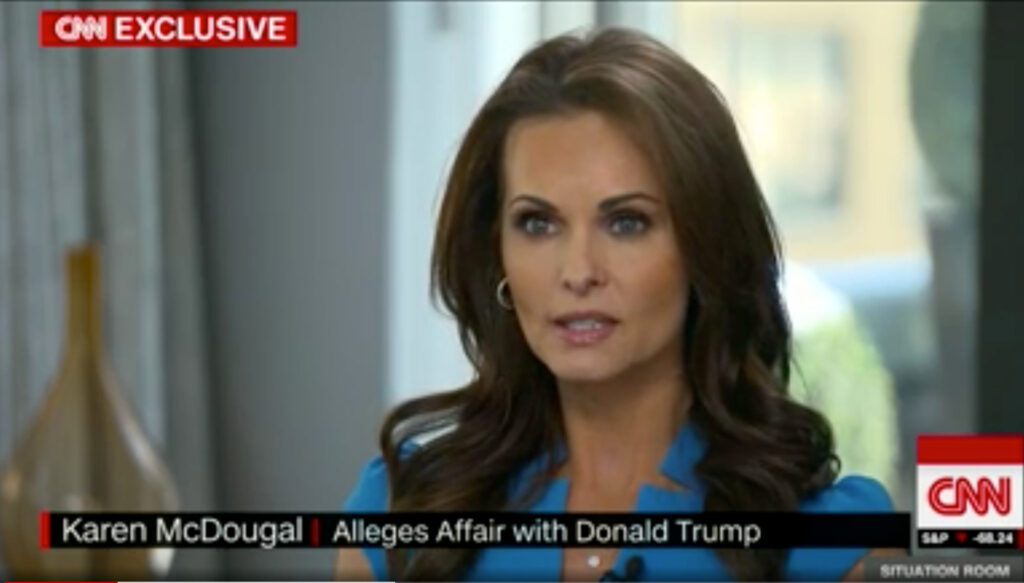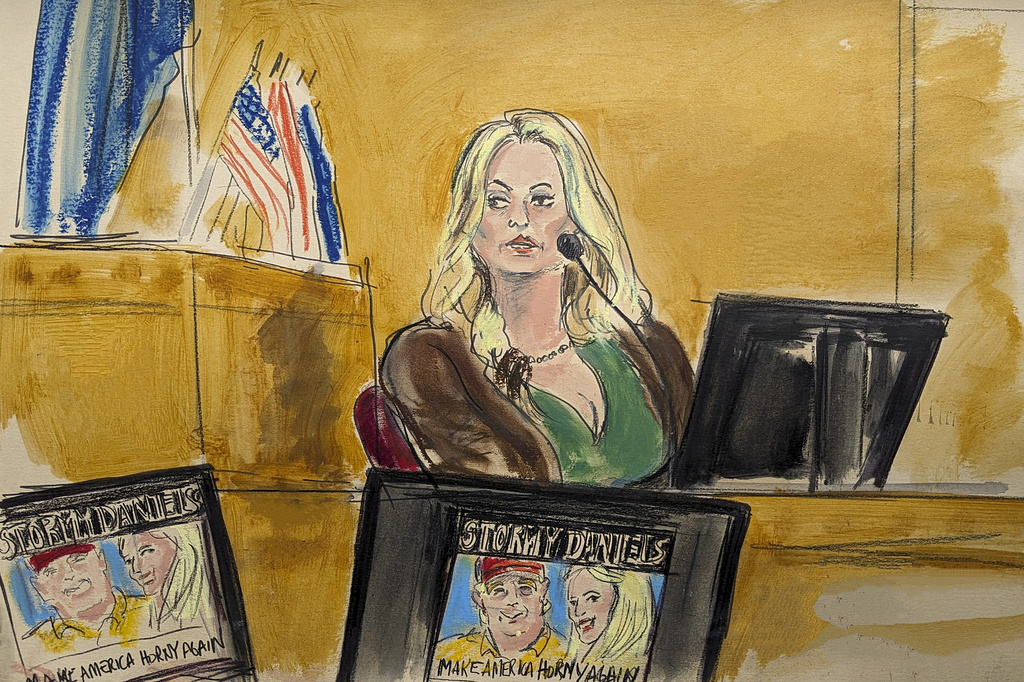‘We Need To Stop This From Getting Out’: Cohen Tells of Payments to Women Who Claimed Sex With Trump
As President Trump watched in the courtroom, the former president’s longtime fixer described his role in brokering payments to Stormy Daniels and Karen McDougal.

President Trump’s former lawyer and current archenemy, Michael Cohen, began testifying in the hush-money trial on Monday. The key witness, who appeared surprisingly somber, confirmed many of the details the jury had previously heard as he explained the hush-money payment he made to the adult film star Stormy Daniels.
Mr. Trump entered the courtroom followed by an entourage that included Senator Vance, Senator Tuberville, Congresswoman Nicole Malliotakis, his former White House aide Boris Epshteyn, defense attorney Alina Habba, and Mr. Trump’s adult son, Eric.
In the hallway, Mr. Trump waved a New York Times article at court reporters, which showed him leading in polls of key swing states. He also referred to the CNN broadcaster Fareed Zakaria, who recently criticized the Manhattan district attorney, Alvin Bragg, for bringing this case against Mr. Trump, the first criminal case against a former president in U.S. history.
Mr. Trump lamented that the courthouse was so tightly guarded by security personnel that his supporters couldn’t get closer to the entrance. “We had a hundred thousand people in New Jersey,” he said, referring to the campaign rally he had held there over the weekend. “They would like to show their support. It’s like an armed camp outside, you can’t get within three blocks of this courthouse.”

The disbarred Cohen, who worked for Mr. Trump from 2006 until 2018, when he was arrested and sentenced to 13 1/2 months in federal prison and a year and a half in home confinement after pleading guilty to campaign finance charges and lying to Congress, did not look at his former boss as he walked into the courtroom.
He answered the questions from prosecutor Susan Hoffinger in a calm and somber voice, using obedient phrases like, “No, ma’am,” and “Yes, ma’am” frequently.
Cohen told the jury that his father, a Holocaust survivor, came from Canada to the United States, and “four children later, here I am.” He had gone to law school because his grandmother wanted him to, while he had wanted “to go to Wall Street” instead, Cohen said.
In 2006, Cohen left his law firm to work for the Trump Organization after he had done some legal work for Mr. Trump, for which, according to Cohen, Mr. Trump never paid him.

“Would you want to come work for me?” Cohen told the jury Mr. Trump said after Cohen had presented him with a legal bill for about $100,000 for the work he had done for him. When he asked Mr. Trump if he would pay him the money he owed him, Cohen said Mr. Trump “asked if I would like to get fired on the first day.” The bill was never paid.
Cohen said he would often renegotiate bills for Mr. Trump, like several deals he had with companies involved with the Trump University business. Cohen said that was able to get almost all of the companies to lower their rates. Mr. Trump, Cohen testified, was pleased and said Cohen had done a “fantastic” job.
“How did that make you feel?” Ms. Hoffinger asked the witness.
“Like I was on top of the world,” Cohen replied, later adding that “it was fantastic working for him,” referring to Mr. Trump, “especially during those 10 years. It was an amazing experience in many, many ways. There were great times, there were several less than great times, but for the most part, I enjoyed the responsibilities that were given to me,” Cohen testified.

One of the things with which Cohen was tasked was to deal with journalists who reported negatively about Mr. Trump. “I would reach out to the press, and I would express to them either their need to redact or take the article down, or we would file an action against them,” Cohen testified.
“Did you do it in a strong and threatening manner at times?” Ms. Hoffinger asked.
“Not all the time, but often,” Cohen said.
Before Mr. Trump officially announced he was running for president, Cohen remembered telling him he should be wary about women who may want to publicize their past encounters with him.

“You know that when this comes out, meaning the announcement, just be prepared there’s going to be a lot of women coming forward,” Cohen testified saying to Mr. Trump. He then told the jury about the August 2015 meeting at Trump Tower he claims to have attended with Mr. Trump and the then-publisher of the National Enquirer, David Pecker. There the three men, according to Mr. Pecker’s and Cohen’s testimonies, devised a scheme to use the supermarket tabloid to help Mr. Trump’s election campaign.
“What was discussed is the power of the National Enquirer in terms of being located at the cash register of so many supermarkets and bodegas. That if we can place positive stories about Mr. Trump that would be beneficial, and if we could place negative stories about some of the other candidates, that would also be beneficial,” Cohen testified.
“What he said was that [Mr. Pecker] could keep an eye out for anything negative about Mr. Trump and that he would be able to help us know in advance what was coming out and try to stop it from coming out,” Cohen continued, confirming Mr. Pecker’s testimony from three weeks ago.
After Cohen detailed how Mr. Pecker and the Enquirer paid $150,000 to Karen McDougal, Playboy’s Playmate of the Month for December 1997 and Playmate of the Year for 1998, to buy her silence about a nine-month affair she claims to have had with Mr. Trump, which he denies, the prosecution played a 2016 conversation between Cohen and Mr. Trump, which Cohen secretly recorded on his phone.

Cohen testified that he recorded the conversation so he could “show it to David Pecker and that way he would hear the conversation and he would know that we’re going to be paying him back, that Mr. Trump was going to be paying him back.”
“I also wanted him to remain loyal to Mr. Trump,” Cohen added.
When the prosecution asked Cohen if Mr. Trump was aware of the fact that Cohen was recording him, he said, “No, ma’am.”
During the conversation, which took place two months before Election Day, Cohen tells Mr. Trump, “I’ve spoken to Allen Weisselberg about how to set the whole thing up with,” referring to Weisselberg, Mr. Trump’s longtime and former chief financial officer, who is currently jailed at Rikers Island.

“So, what do we got to pay for this? One-fifty?” Mr. Trump then asks.
Cohen told the jury that the “One-fifty” referred to the $150,000 that Mr. Pecker had paid Ms. McDougal to keep silent about her affair.
Weisselberg had said, Cohen also testified, that this kind of payment needed to come from a non-Trump Organization entity.
“I went to Allen’s Office. I expressed to him that we need funding of $150,000 to consummate this transaction. Allen then said to me, ‘Well, if we do it from a Trump entity, that kind of defeats the purpose,'” Cohen said.

This led to Cohen opening his own shell company, Resolution Consultants LLC, which he later renamed as Essential Consultants LLC, “to use this entity for the assignment of the McDougal matter as well as the other information.”
The banker, Gary Farro, who opened the accounts for Cohen at First Republic Bank, had testified earlier in the trial. Most of Cohen’s testimony had been confirmed by other witnesses or was substantiated by documents.
One intriguing detail Cohen described was that Melania Trump, Mr. Trump’s third wife, was the one who suggested Mr. Trump use the phrase “locker room talk” to explain the offensive comments he made to television host Billy Bush, about being able to grab any woman he wanted, on the now infamous “Access Hollywood” tape which was made public just weeks before Election Day in 2016, sparking a crisis in the Trump campaign.
“He wanted me to reach out to all of my contacts in the media who needed to put a spin on this,” Cohen said. “The spin that he wanted to put on it was that this was locker room talk — something that Melania had recommended, or at least he told me that’s what Melania thought it was, and use that in order to get control over the story and minimize its impact on him and his campaign.”

At the presidential debate against Secretary Clinton that took place shortly after the “Access Hollywood” tape became public, Mr. Trump used the phrase “locker room talk.”
Mr. Trump, who sat at the defense table, shook his head during Mr. Cohen’s recounting of the “Access Hollywood” crisis. During the first part of Cohen’s testimony, Mr. Trump would either doze off or whisper with his attorneys, but avoid directly looking at Cohen. Since the witness stand is slightly off set, Cohen and Mr. Trump were not forced to make eye contact if they didn’t want to. Cohen, evidently nervous, looked all over the room as he spoke, his eyes wandering from Mr. Trump to the attorneys to the reporters and to the jury. Only after the lunch break, as Cohen detailed the hush-money payment to Stormy Daniels, did Mr. Trump actually look at him.
Stormy Daniels, whose real name is Stephanie Clifford, claims she had a one night sexual encounter with Mr. Trump at a celebrity golf tournament at Lake Tahoe in 2006. Mr. Trump denies the allegation. With the 2016 election only weeks away, Cohen found out that Ms. Clifford was seeking to sell her story about sex with Mr. Trump. With the “Access Hollywood” tape already having done damage to Mr. Trump’s reputation, Cohen testified that Mr. Trump told him to buy Ms. Clifford’s story.
“He told me to work with David [Pecker] and get control over this — purchase the life rights. We need to stop this from getting out,” Cohen said.

“He said this is a disaster, total disaster. Women are going to hate me,” Mr. Trump said, Cohen testified. “Guys may think this is cool, but this is going to be a disaster for the campaign.”
Cohen further testified that he asked Mr. Trump how his wife Melania would respond to Ms. Clifford’s claim.
“How’s things going to go upstairs?” Cohen said he asked Mr. Trump, whose penthouse residence at Trump Tower on Fifth Avenue was several floors above the Trump Organization’s offices.
According to Cohen, Mr. Trump responded, “How long do you think it’ll be on the market for? Not long.” He was referring to the story that Ms. Clifford was trying to sell.

Cohen said Mr. Trump’s main concern was his election campaign.
“This was all about the campaign,” Cohen said.
“I want you to push it out as long as you can,” Cohen said Mr. Trump told him about the Ms. Clifford’s story. “Push it out past the election, because if I win, it has no relevance, and if I lose, I don’t really care.”
Cohen told the jury that it was all “about delaying the deal and trying to push it past the election, which was coming.”
Cohen will be back on the witness stand tomorrow.

